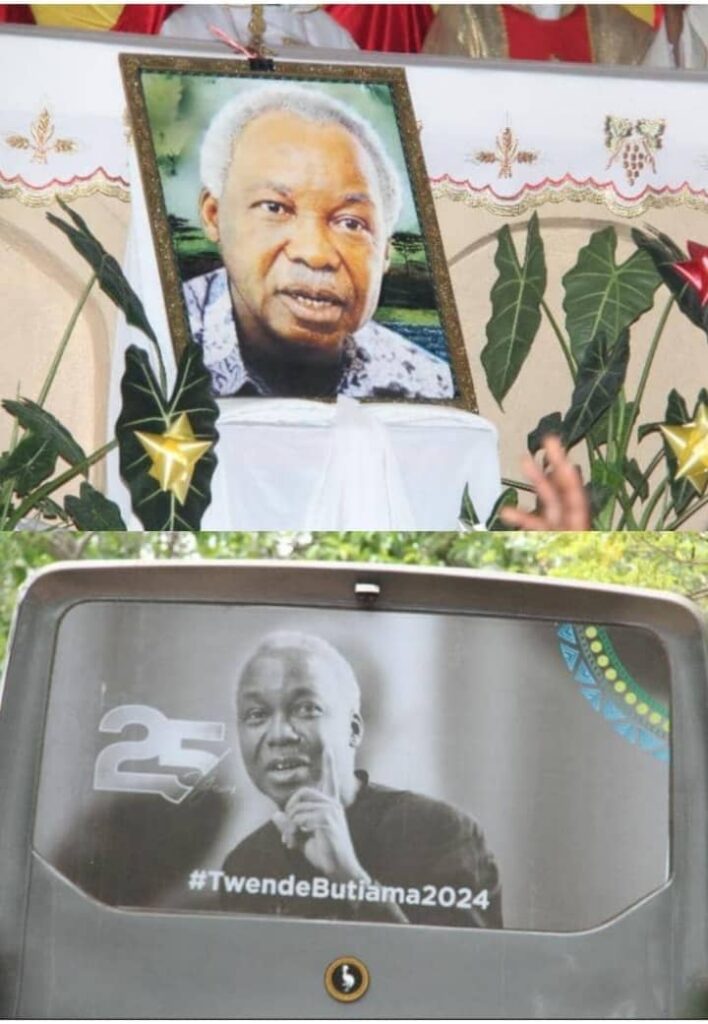By Julius Mugaga Tukacungurwa/Umoja Standard.
Butiama, Mwanza: Tanzania has commemorated the 25th anniversary of Mwalimu Julius Nyerere’s passing, celebrating his life and legacy as the nation’s founding father (Baba Wa Taifa). This milestone serves as a poignant reminder of the values and principles that have guided Tanzania’s progress and continue to shape its future. Nyerere’s vision for social justice, education, and self-reliance remains a powerful inspiration to the nation, offering valuable lessons for current and future leaders.

As a champion of Pan-Africanism, Nyerere believed that Africa’s liberation was inseparable from unity. He famously declared, “Without unity, there is no future for Africa.” His philosophy of Ujamaa (socialism) and self-reliance, as outlined in the Arusha Declaration of 1967, emphasized the importance of utilizing Tanzania’s natural resources to improve citizens’ welfare. Nyerere’s patriotism and commitment to inclusive sustainable development continue to be emulated by leaders striving to protect national independence and promote development.
Uganda’s State Minister for East African Community Affairs unveil the Afrika Mashariki Fest Magazine in memory of fallen hero, Mwalimu Julius Kambarage Nyerere/Photo by Julius Mugaga Tukacungurwa.
The Uhuru Torch
On a national level, The Uhuru Torch, a symbol of Tanzania’s struggle for independence, has been racing across the country since April, inspecting over 1,500 projects worth 10.8 trillion shillings in 180 district councils. This year’s theme, “Protect the environment and participate in Local Government Elections to build a sustainable nation,” reflects Nyerere’s enduring vision.

Journalists across Africa cover the #TwendeButiama2024 Pilgrimage/Photo by Julius Mugaga Tukacungurwa.
Special prayers will be held at the Roman Catholic Diocese of Saint Francisco Xavery in Mwanza, and President Samia will launch a book detailing the history and philosophy of the Uhuru Torch.
As Tanzania reflects on its progress and challenges, Nyerere’s legacy serves as a powerful reminder of the nation’s potential and the importance of staying true to its founding principles.
TWENDE BUTIAMA PILGRIMAGE 2024
Today, 14th October, 2024, East Africa, Africa and the entire world has gathered to Honor the legacy of a visionary leader, Mwalimu Julius Nyerere, 25 years after his passing. Under the theme, “‘Espousing Mwalimu Julius Nyerere’s Enduring Legacy and Values – Lessons from Mother Africa’, the #TwendeButiama2024 event seeks to reflect on Nyerere’s profound impact on East Africa’s unity, cooperation, and development. This commemoration, organized by Africa Mashariki Fest, provides a platform for leaders, youth, and communities to draw inspiration from Nyerere’s values and vision, and to chart a course for a brighter future for the region.

Multitude Arrive At Butiama, Mwanza Region in United Republic of Tanzania for Pilgrimage/Photo by Julius Mugaga Tukacungurwa.
Held at his birth place as well where he was laid to rest in Butiama, Mwanza Region in the United Republic of Tanzania, the day saw a multitude of people from different divides to pay tribute the fallen hero.
The event started with the celebration of the holy mass thereafter a tour around the entire area and the Julius Nyerere Museum and climaxed with high level discussion on reflections of the legacy of Mwalimu Julius Nyerere in shaping the current political, social and economic environment of East Africa and Africa as a whole.
Speaking at Butiama, Mwanza, Maj. Gen. Paul Simuli Kisesa, the United Republic of Tanzania High Commissioner to Uganda, shared inspiring remarks about Mwalimu Julius Nyerere, Tanzania’s former president. Ambassador Kisesa reflected on the significant impact of Nyerere’s legacy, revealing that his firstborn son was born on the same day Nyerere died, a painful reminder of the 25 years that have passed since then.

Maj. Gen. Paul Simuli Kisesa, the United Republic of Tanzania High Commissioner to Uganda speaks at the commemoration event of 25 years of Mwalimu Julius Nyeerere Passing & 25 years of revived East African Community at Butiama, Mwaza Region in the United Republic of Tanzania/Photo by Julius Mugaga Tukacungurwa.
Kisesa highlighted Nyerere’s remarkable journey, from humble village beginnings to becoming a transformative leader. Despite his modest upbringing, Nyerere introduced free education for all Tanzanians, demonstrating his commitment to empowering his people. The ambassador encouraged Gen Z to draw inspiration from Nyerere’s story and leverage opportunities to build a stronger Africa.
Nyerere’s achievements are a testament to his vision and determination. By the age of 12, he had already begun his journey, eventually fighting for independence and promoting Swahili as a unifying language across East Africa. Under his leadership, Tanzania made significant strides in combating tribalism and nepotism, fostering an inclusive environment.
As Kisesa noted, Nyerere championed the unity of East African Community member states, using Swahili to bridge cultural divides. His legacy serves as a powerful reminder of the importance of leadership, unity, and education in shaping a brighter future for Africa.
His counterpart, Col. Fred Mwesigye, Uganda’s High Commissioner to the United Republic of Tanzania, used the same platform to emphasize the crucial elements needed to achieve the dream of an East African community championed by late Mwalimu Julius Nyerere. He noted that the absence of a single language, currency, and unified army force hinders regional security and progress.
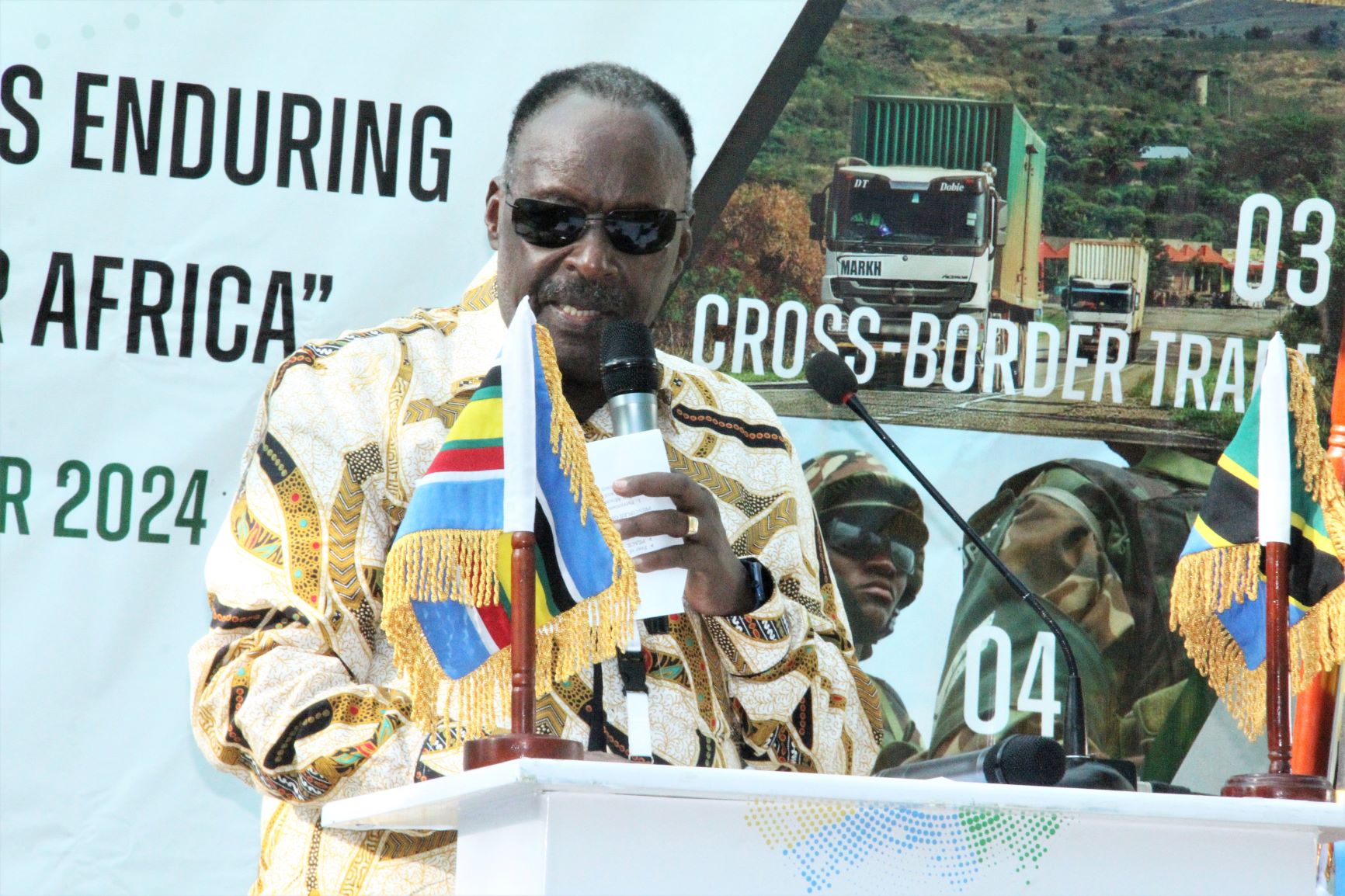
Col. Fred Mwesigye, Uganda’s High Commissioner to the United Republic of Tanzania speaks at the commemoration event of 25 years of Mwalimu Julius Nyerere Passing & 25 years of revived East African Community at Butiama, Mwaza Region in the United Republic of Tanzania/Photo by Julius Mugaga Tukacungurwa.
Mwesigye cautioned, “If we don’t unite, we shall be eaten up by the imperialists. Our children will not enjoy our hard work.” He envisioned a cooperative approach where each country specializes in producing specific agricultural products, fostering regional collaboration.
To enhance integration, Mwesigye stressed the importance of awareness among the general public. “Currently, many people in the region are unaware of the integration efforts, making it challenging for them to participate. Even the East African Legislative Assembly (EALA) meetings are often confined to hotels, missing opportunities for meaningful engagement with local communities.” He noted.
As a seasoned diplomat and former military officer, Mwesigye’s insights draw from his experience serving as Uganda’s High Commissioner to Tanzania since 2021. His commitment to regional cooperation is evident in his efforts to promote economic ties and cultural exchange between Uganda and Tanzania. By highlighting the obstacles and opportunities for growth, Mwesigye encourages East African nations to work together towards a brighter future thereby living the legacy of late Nyerere.
Earlier on, Magode Ikuya, Uganda’s Minister of State for East African Community Affairs, had praised Mwalimu Julius Nyerere’s remarkable efforts to unite East Africa, describing his work as immense and far-reaching.
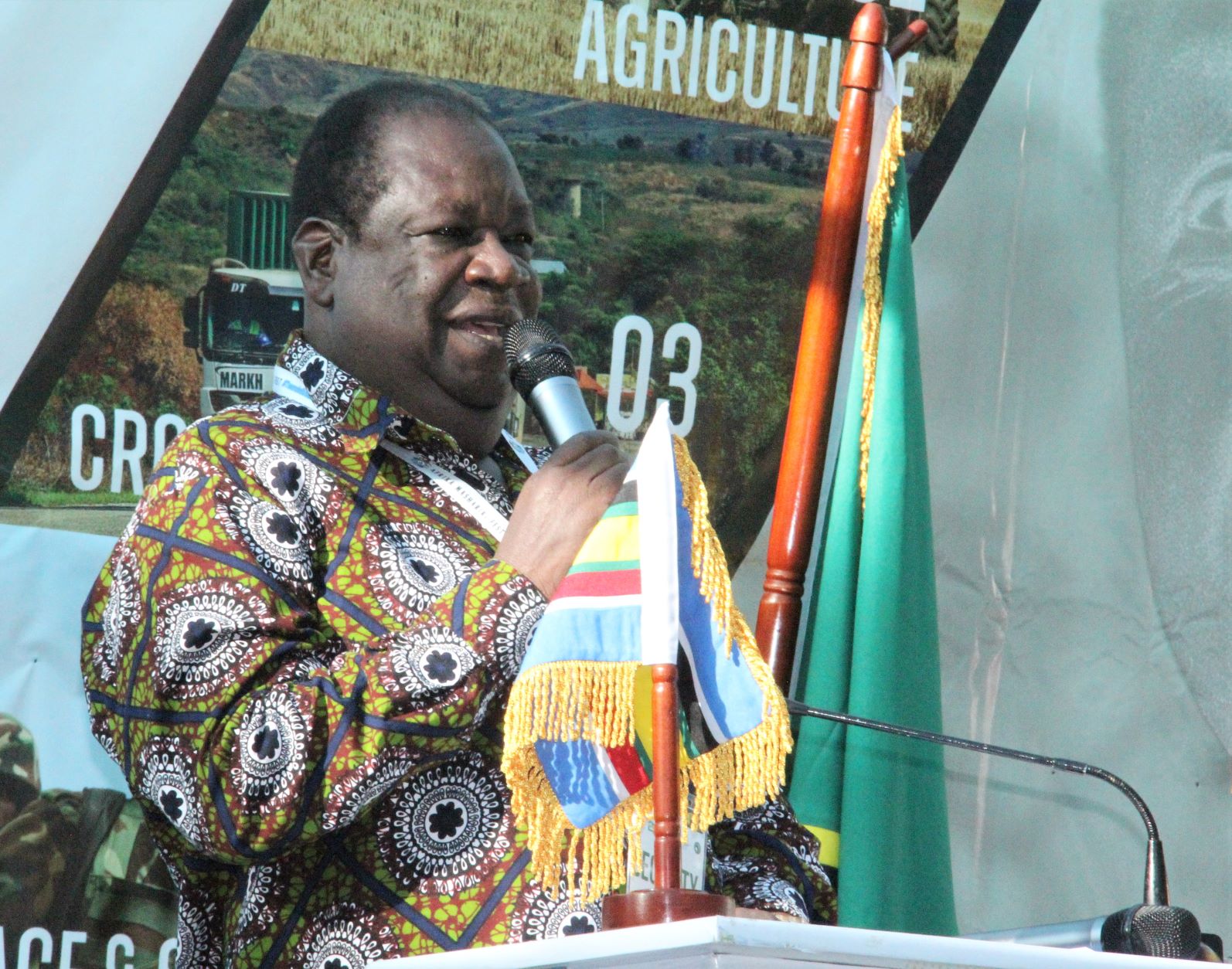
Hon. Magode Ikuya, Uganda’s Minister of State for East African Community Affairs delivers at the commemoration event of 25 years of Mwalimu Julius Nyerere Passing & 25 years of revived East African Community at Butiama, Mwaza Region in the United Republic of Tanzania/Photo by Julius Mugaga Tukacungurwa.
Although some leaders seem to be straying from Nyerere’s vision, Ikuya emphasized that his contributions remain crucial for the continent’s future. He urged current leaders to reorganize and dedicate themselves to serving their people with diligence, embodying the spirit of Africa.
“By doing so, they can build upon Nyerere’s legacy and propel the region toward greater unity and progress.” He noted. Ikuya’s sentiments reflect the ongoing quest for regional cooperation and integration, echoing the principles of the East African Community.
As a key figure in Uganda’s government, Ikuya’s call to action underscores the importance of collective leadership in shaping a brighter future for East Africa.
In the same way, Professor Mwambushya Ndebesa from Makerere University reflected on Julius Nyerere’s enduring legacy, 25 years after his passing. Ndebesa highlighted Nyerere’s remarkable attributes, including his unwavering commitment to equality, socialism, and education through Ujaama. This ideology not only promoted economic empowerment but also fostered a sense of community and national unity.
 Prof. Mwambutsya Ndebesa, a senior lecturer of History at Makerere University Speaking in Butiama, Mwanza/Photo by Julius Mugaga Tukacungurwa.
Prof. Mwambutsya Ndebesa, a senior lecturer of History at Makerere University Speaking in Butiama, Mwanza/Photo by Julius Mugaga Tukacungurwa.
Ndebesa also praised Nyerere’s selfless behaviour, citing his resignation and transfer of power to Rashid Kawawa in 1961. Furthermore, Nyerere delayed Tanganyika’s independence until all East African countries were liberated, demonstrating his vision for a united Africa. This humility and willingness to prioritize the greater good earned him the nickname “Mwalimu,” meaning teacher.
Ndebesa emphasized that Nyerere’s legacy extends beyond his presidency, inspiring future generations to strive for African unity and collective progress. He urged East Africans to transcend mental borders, recognizing that physical boundaries and treaties are mere formalities compared to the power of shared ideology and purpose. “By embracing this mindset, the region can overcome tribalism, nepotism, and other divisions that hinder progress.” He stressed.
As Issa G. Shivji, Mwalimu Nyerere University Professor of Pan-African Studies, noted, Nyerere’s pan-Africanist nationalism found its expression in the Arusha Declaration of 1967, which rallied Africans against oppression, exploitation, and humiliation. This vision remains relevant today, reminding us that African liberation and unity are inseparable.
For Uganda’s General Gregory Mugisha Muntu, President of the Alliance for National Transformation political party, reflected on Mwalimu Julius Nyerere’s legacy, emphasizing the importance of learning from past failures to strengthen the East African Community. He urged the focus to shift from past setbacks to leveraging available potential and endowments to drive change.
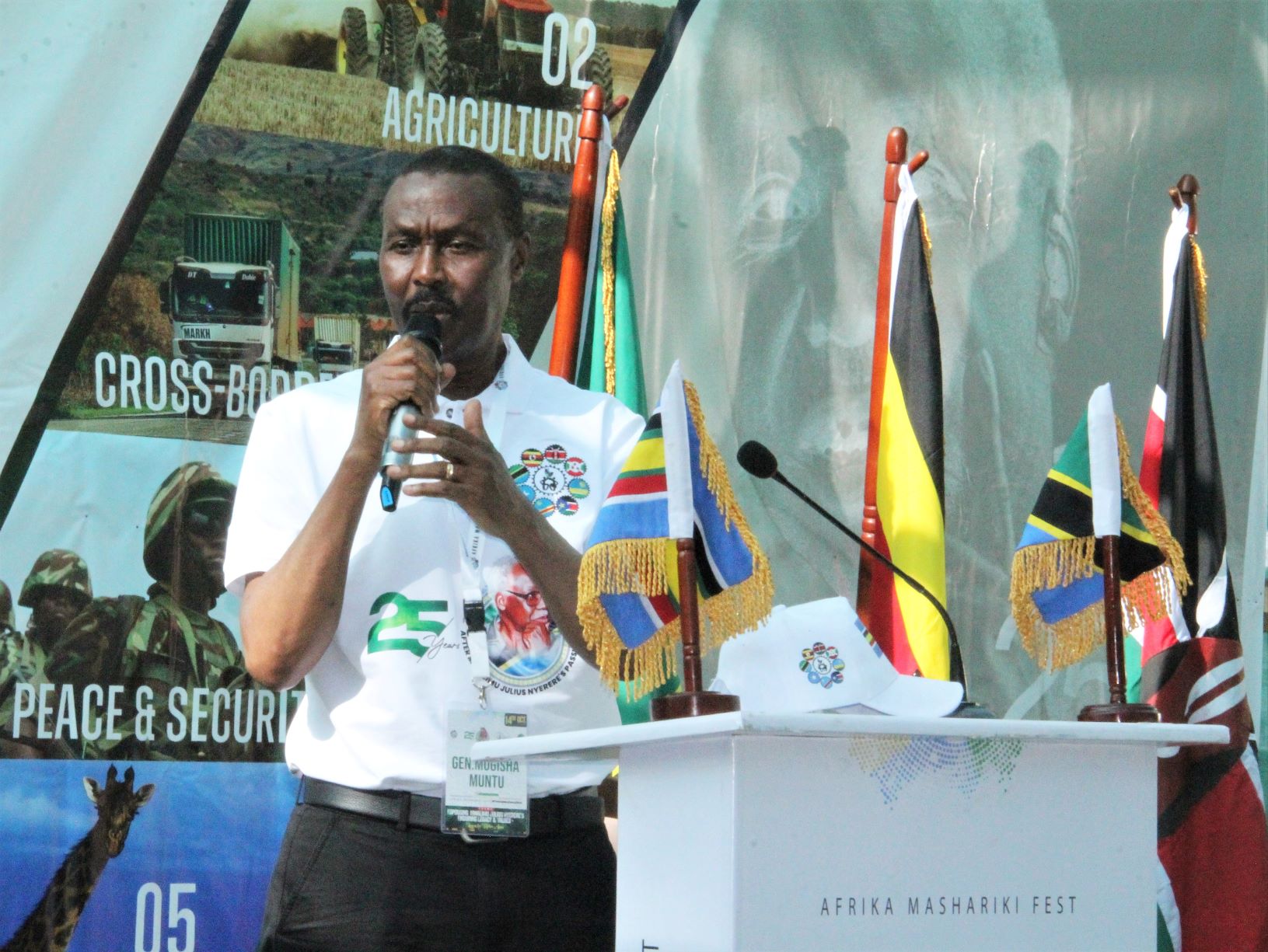
Uganda’s General Gregory Mugisha Muntu, President of the Alliance for National Transformation (ANT) political party Speaks of Nyerere’s legacy/Photo by Julius Mugaga Tukacungurwa.
Muntu stressed the need for innovative thinking and robust systems to effectively manage countries, leading to liberation. He also cautioned against the pitfalls of instant gratification, warning that celebrating Nyerere’s legacy would be in vain without genuine progress.
Muntu attributed Africa’s challenges to weaknesses in character, rather than intelligence, pointing out that some leaders accumulate wealth that could uplift millions. He envisioned a transparent system where development benefits all, citing Singapore and South Korea as inspiring examples of transformation from struggling to thriving nations.
As a seasoned politician and former military officer, Muntu’s insights draw from his experience leading the Alliance for National Transformation, a party he founded in 2019.
Uganda’s seasoned Journalist, Andrew Mwenda, founder of The Independent Magazine in Kampala-Uganda, emphasized that youth performance is closely tied to the example set by their elders. He noted that young people are often complacent due to lack of opportunities to take on leadership roles independently.

Ugandan seasoned Journalist, Andrew Mwenda, speaks about the values of Mwalimu Julius Nyerere/Photo by Julius Mugaga Tukacungurwa.
However, Mwenda believes that once given the chance, youth will rise to the challenge and become driven leaders, advancing the East African community’s vision, a key aspect of Mwalimu Julius Nyerere’s legacy.
“This perspective aligns with research highlighting the importance of youth development programs in fostering motivation and concentration among young individuals. Effective leadership and opportunities for growth are crucial in unlocking the potential of youth to propel regional progress.
For Madaraka Nyerere, son of Mwalimu Julius Nyerere, emphasized the importance of boosting security operations uniformly across all regions and harnessing common market union protocols to empower young people. He acknowledged criticisms that the youth have not done enough to carry forward the legacy of their former leaders.

Madaraka Nyerere, son of Mwalimu Julius Nyerere speaks about his fallen father at the commemoration event of 25 years of his Passing & 25 years of revived East African Community at Butiama, Mwaza Region in the United Republic of Tanzania/Photo by Julius Mugaga Tukacungurwa.
Despite this, Madaraka expressed gratitude to the governments of Tanzania and Uganda for recognizing the significance of his father’s legacy and supporting commemorative events. He also thanked people worldwide who have participated in honouring Mwalimu Nyerere’s memory.
Mwalimu Nyerere’s transformative impact on Tanzania and East Africa remains profound. As a champion of African socialism, he introduced Ujamaa, promoting economic empowerment and national unity. His vision for a united Africa led to the creation of the East African Community. Today, leaders like Madaraka Nyereret”
The organized, Dr. Ronex Tendo Kisembo, CEO of Afrika Mashariki Fest, made a compelling call to action during the #TwendeButiama2024 Pilgrimage, emphasizing the vital role of regional integration in driving growth and stability in East Africa. He stressed that without dismantling current barriers, integration will remain a pipe dream, highlighting the need for leaders to actively work towards cross-border cooperation and trade.
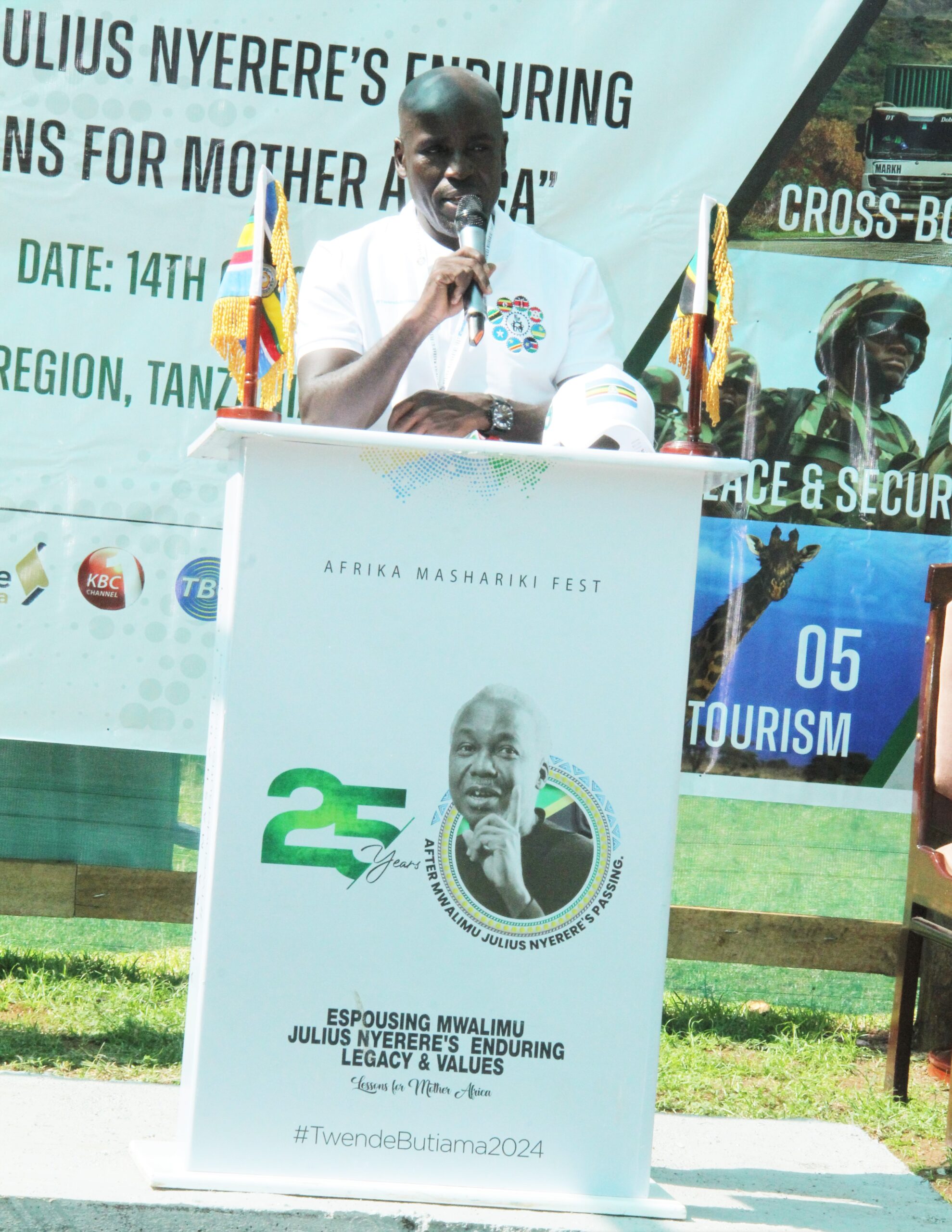
Dr. Ronex Tendo Kisembo, CEO of Afrika Mashariki Fest and organizer of the #TwendeButiama2024 pilgrimage speaks at the event. /Photo by Julius Mugaga Tukacungurwa.
Kisembo also underscored the importance of empowering youth, citing their passion and zeal as crucial elements in advancing East Africa integration. He noted that with 70% of the region’s population under 30, young people are uniquely positioned to champion change and bring fresh perspectives to the regional project.
The #TwendeButiama2024 Pilgrimage, organized by Afrika Mashariki Fest, commemorated the 25th anniversary of Mwalimu Julius Nyerere’s passing, celebrating his legacy as a champion of East African unity and cooperation. The event brought together over 400 delegates, including youth leaders, to discuss the future of regional integration and the role of young people in shaping it.
Kisembo’s remarks echoed the sentiments of other leaders, including Julius Odicho, a young Pan-Africanist from Tanzania, who emphasized the need for greater awareness and involvement among East African youth. Odicho noted that approximately 70% of the region’s youth remain uninformed about the East African Community’s (EAC) mission and vision.
The proposed Butiama Accord, highlighted during the pilgrimage, represents a significant step towards realizing the EAC’s vision. If signed by member states, the accord would commit to eliminating trade and movement barriers, creating formal and informal job opportunities, and allowing for increased labor mobility and mutual recognition of qualifications.
PICTORIAL OF MAJOR EVENTS FROM #TWENDEBUTIAMA2024 IN TANZANIA.

 Uganda’s Delegation Arrive at Butiama, Mwanza Region in the United Republic of Tanzania Using Kayoola Bus Manufactured exclusively in Uganda to Celebrate Mwalimu Julius Nyerere/Photo by Julius Mugaga Tukacungurwa.
Uganda’s Delegation Arrive at Butiama, Mwanza Region in the United Republic of Tanzania Using Kayoola Bus Manufactured exclusively in Uganda to Celebrate Mwalimu Julius Nyerere/Photo by Julius Mugaga Tukacungurwa.
 Uganda’s former First Lady Mama Miria Obote Arrives at Butiama, Mwanza Region in the United Republic of Tanzania Using Kayoola Bus/Photo by Julius Mugaga Tukacungurwa.
Uganda’s former First Lady Mama Miria Obote Arrives at Butiama, Mwanza Region in the United Republic of Tanzania Using Kayoola Bus/Photo by Julius Mugaga Tukacungurwa.
PRAYER EVENTS
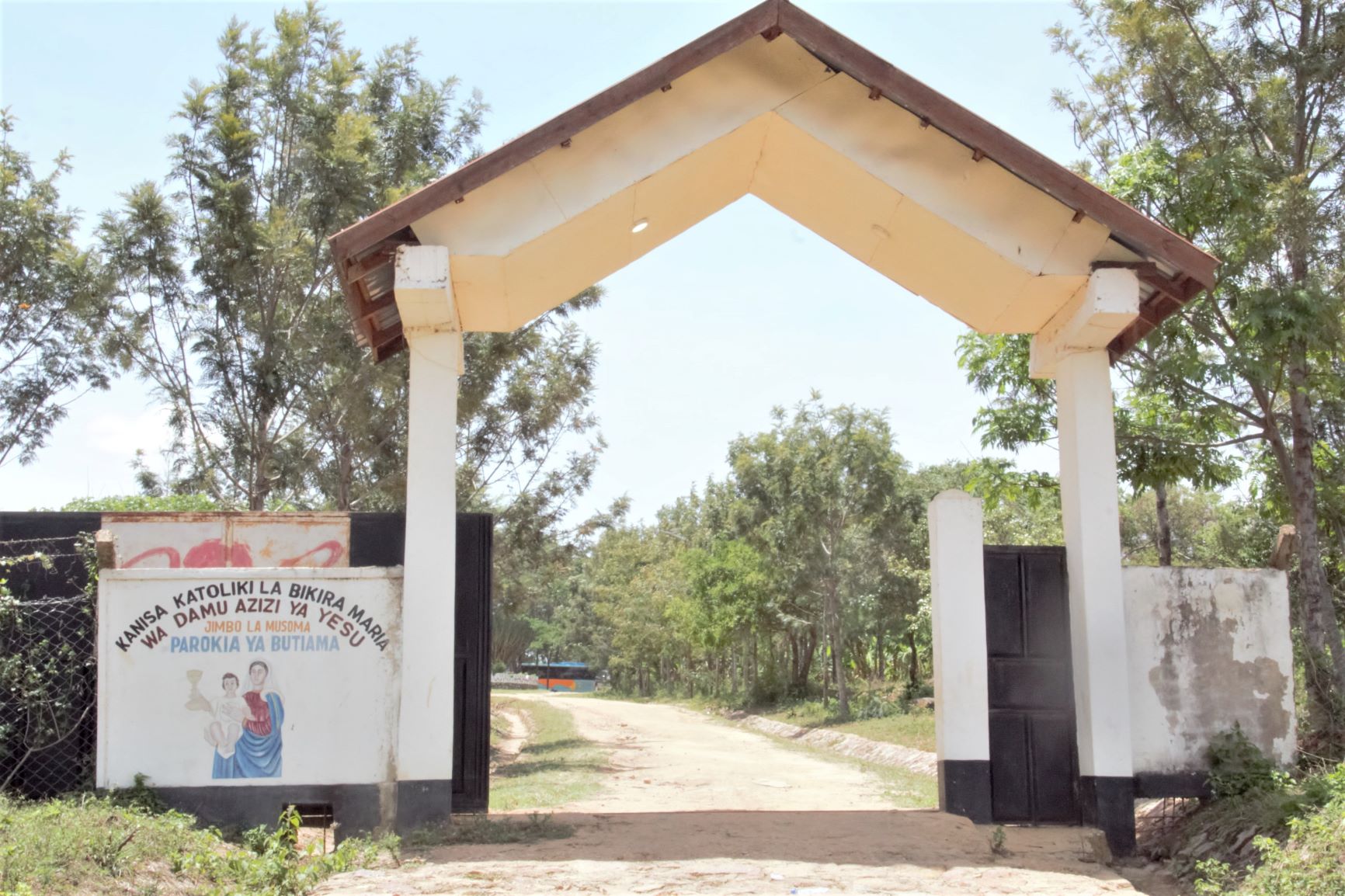 Butiama Catholic Parish, the Late Mwalimu Julius Kambarage Nyerere’s Church, Mwanza Region/Photo by Julius Mugaga Tukacungurwa.
Butiama Catholic Parish, the Late Mwalimu Julius Kambarage Nyerere’s Church, Mwanza Region/Photo by Julius Mugaga Tukacungurwa.
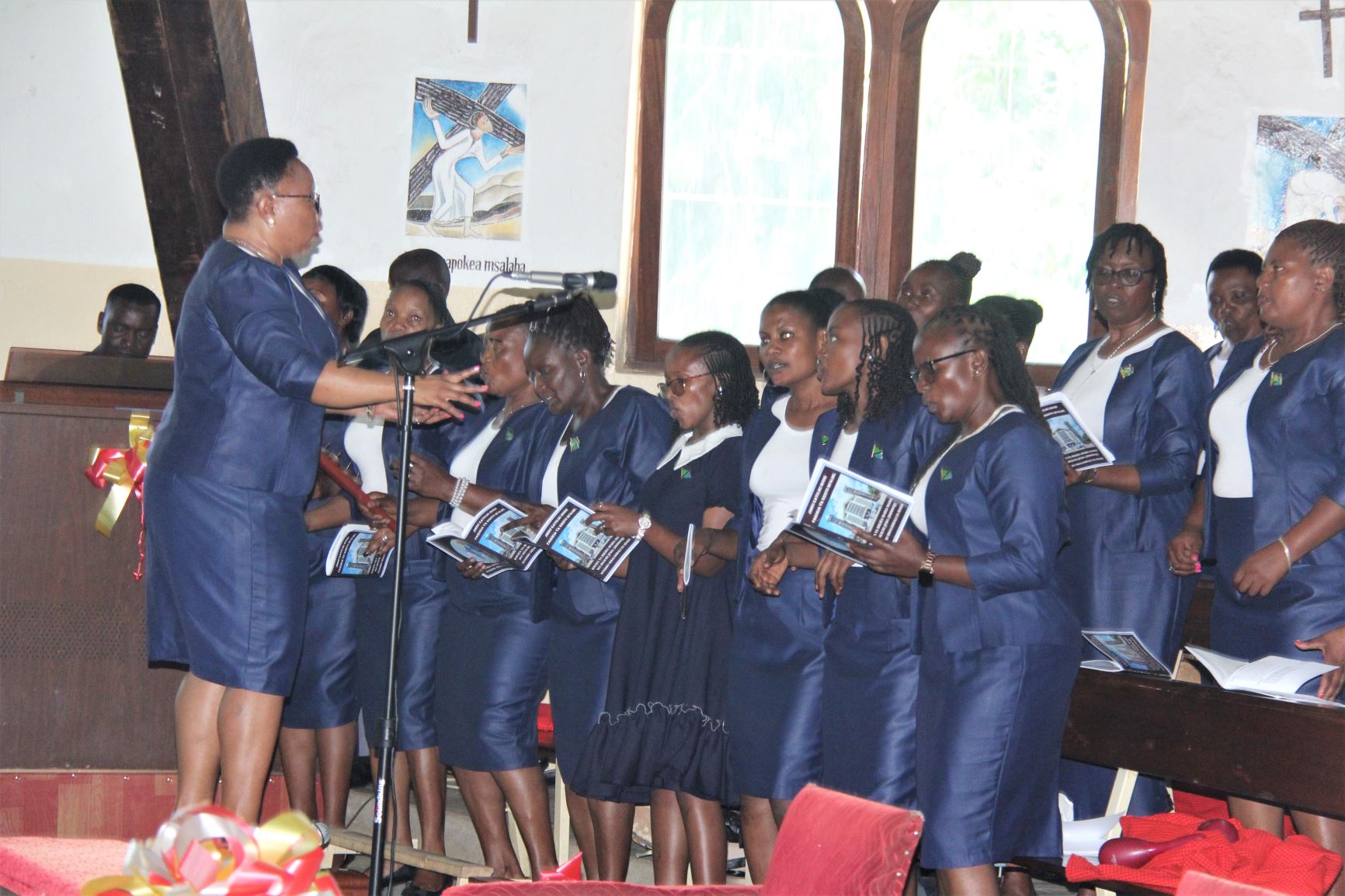 Choir Sings during Holy Mass at Butiama Catholic Parish in Mwanza/Photo by Julius Mugaga Tukacungurwa.
Choir Sings during Holy Mass at Butiama Catholic Parish in Mwanza/Photo by Julius Mugaga Tukacungurwa. Mr. Madaraka Nyerere, Son to Late Mwalimu Julius Kambarage Nyerere is seen during the Holy Mass/Photo by Julius Mugaga Tukacungurwa.
Mr. Madaraka Nyerere, Son to Late Mwalimu Julius Kambarage Nyerere is seen during the Holy Mass/Photo by Julius Mugaga Tukacungurwa.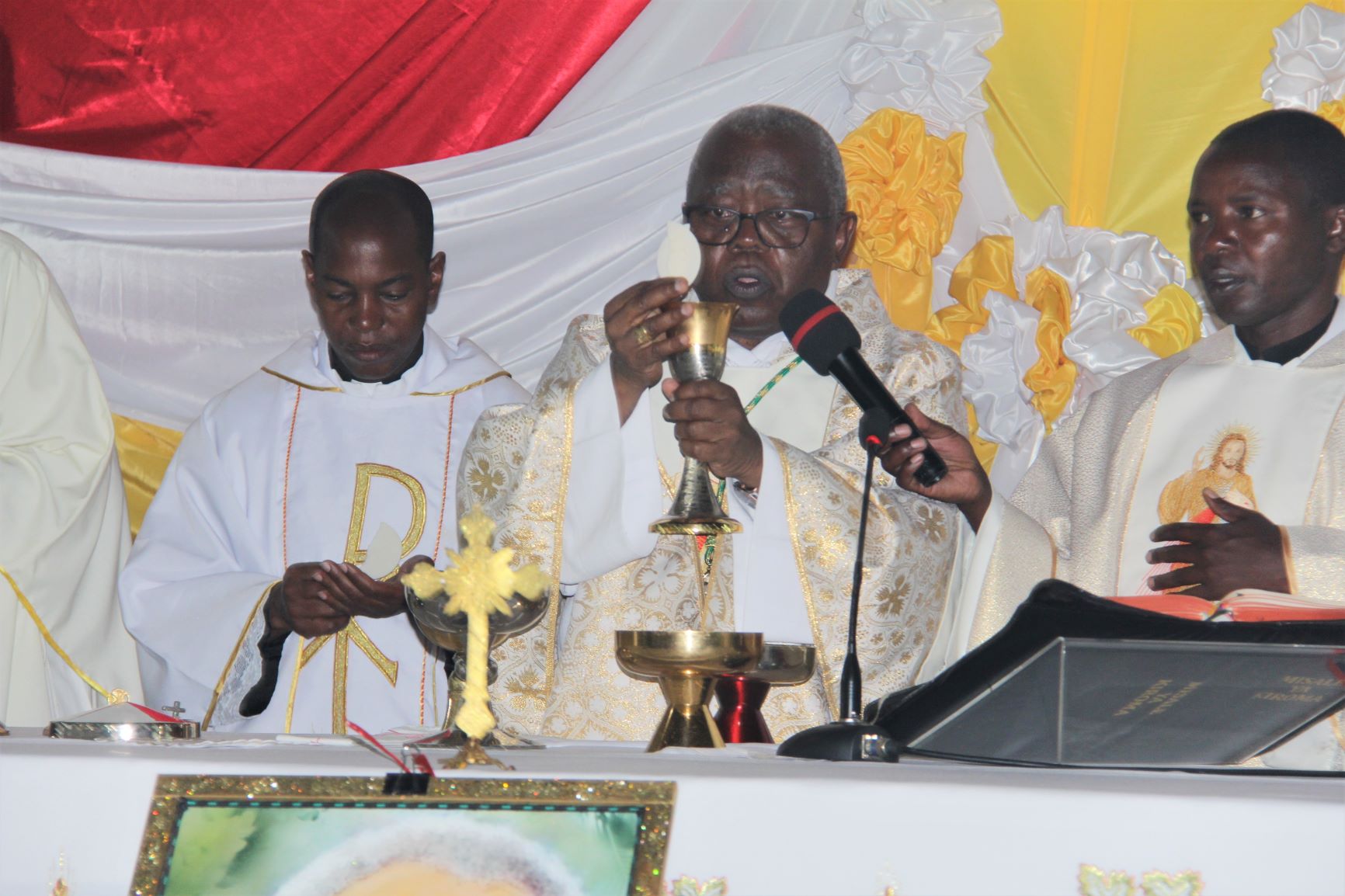 Tanzanian Archbishop Celebrates the Holy Mass at Butiama Catholic Parish during a commemoration event of 25 years of Mwalimu Julius Nyerere Passing & 25 years of revived East African Community at Butiama, Mwaza Region in the United Republic of Tanzania/Photo by Julius Mugaga Tukacungurwa.
Tanzanian Archbishop Celebrates the Holy Mass at Butiama Catholic Parish during a commemoration event of 25 years of Mwalimu Julius Nyerere Passing & 25 years of revived East African Community at Butiama, Mwaza Region in the United Republic of Tanzania/Photo by Julius Mugaga Tukacungurwa.
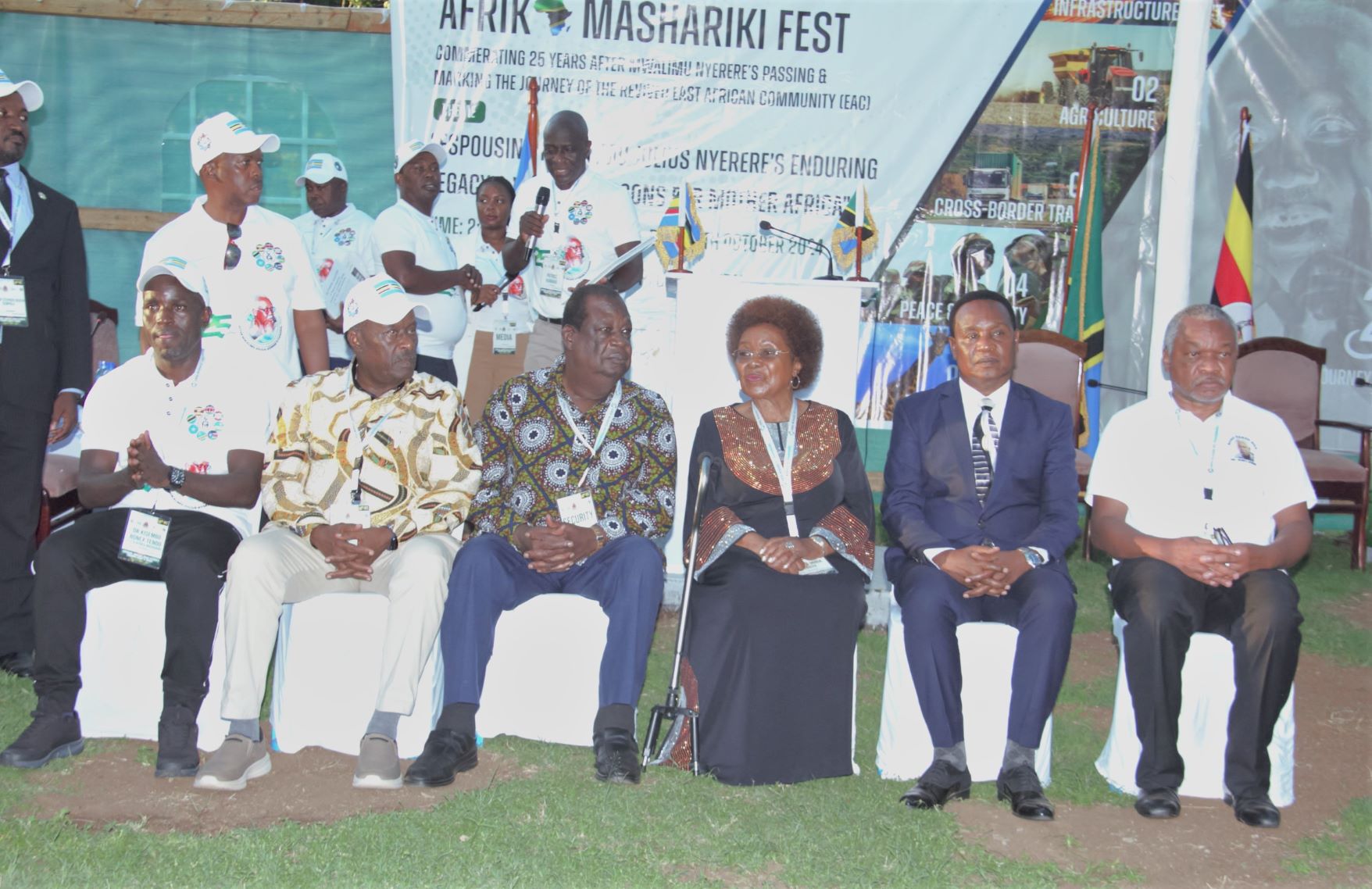 Dignitaries are seen in a group photo at the commemoration event of 25 years of Mwalimu Julius Nyerere Passing & 25 years of revived East African Community at Butiama, Mwaza Region in the United Republic of Tanzania/Photo by Julius Mugaga Tukacungurwa.
Dignitaries are seen in a group photo at the commemoration event of 25 years of Mwalimu Julius Nyerere Passing & 25 years of revived East African Community at Butiama, Mwaza Region in the United Republic of Tanzania/Photo by Julius Mugaga Tukacungurwa.
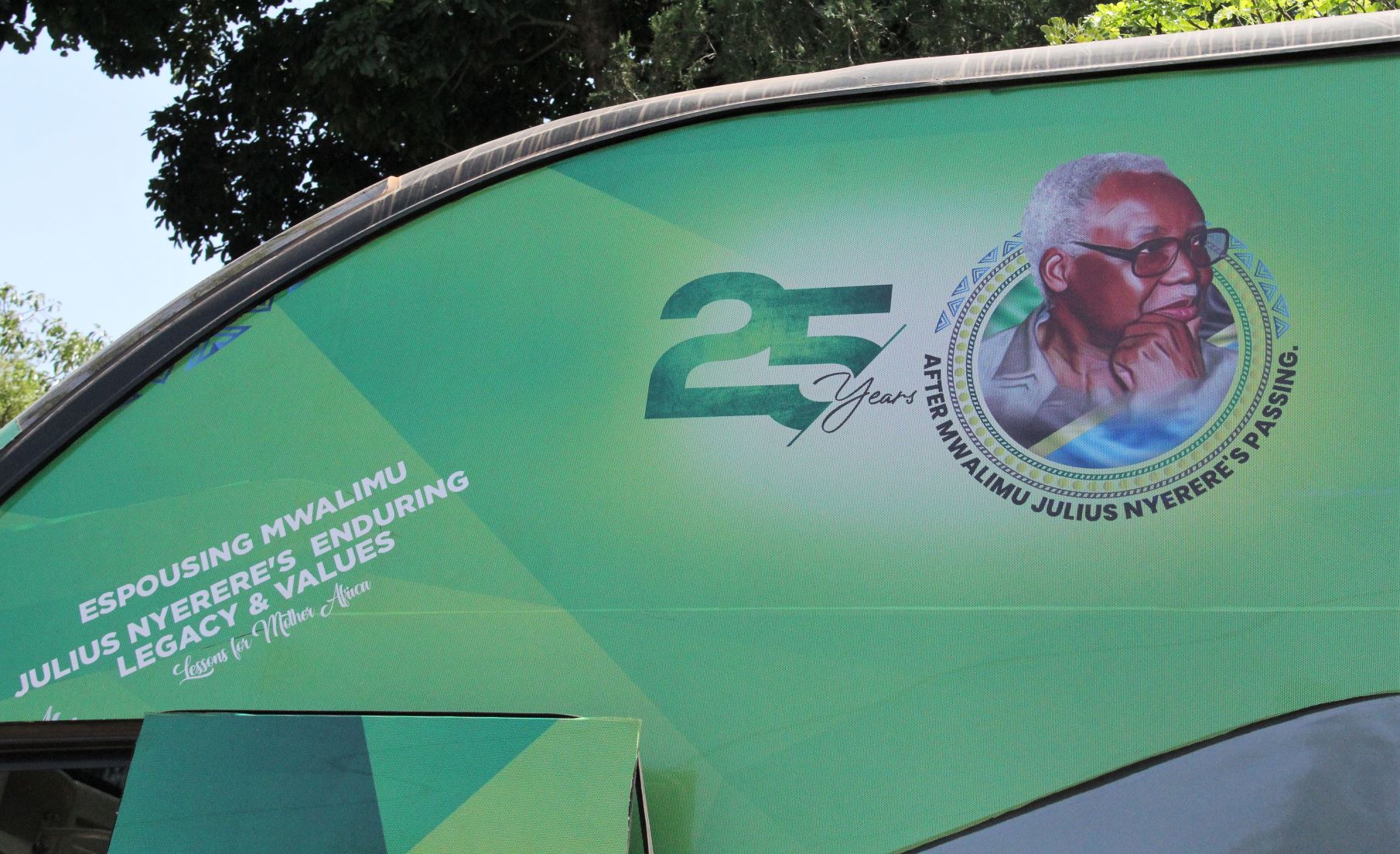
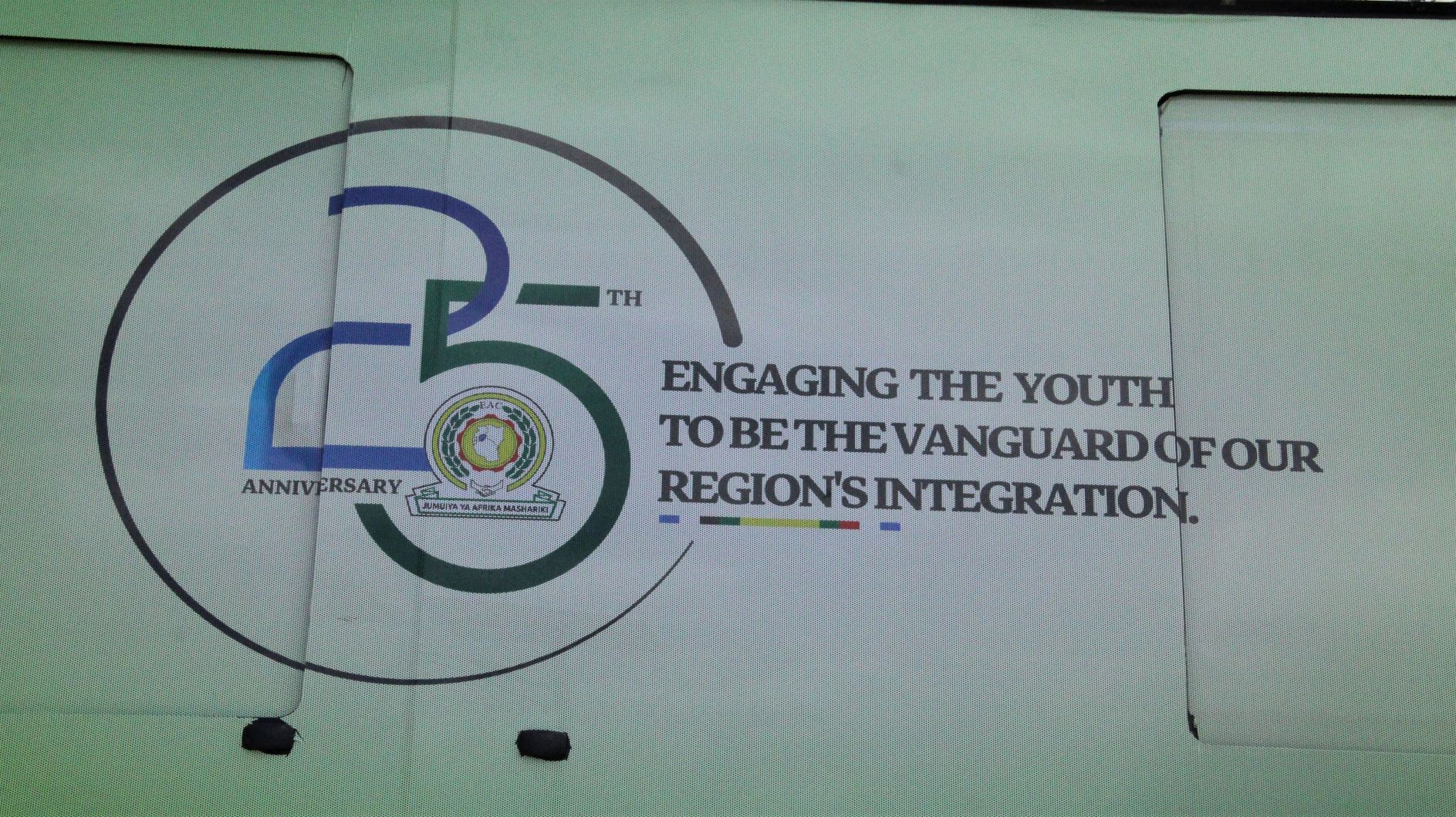
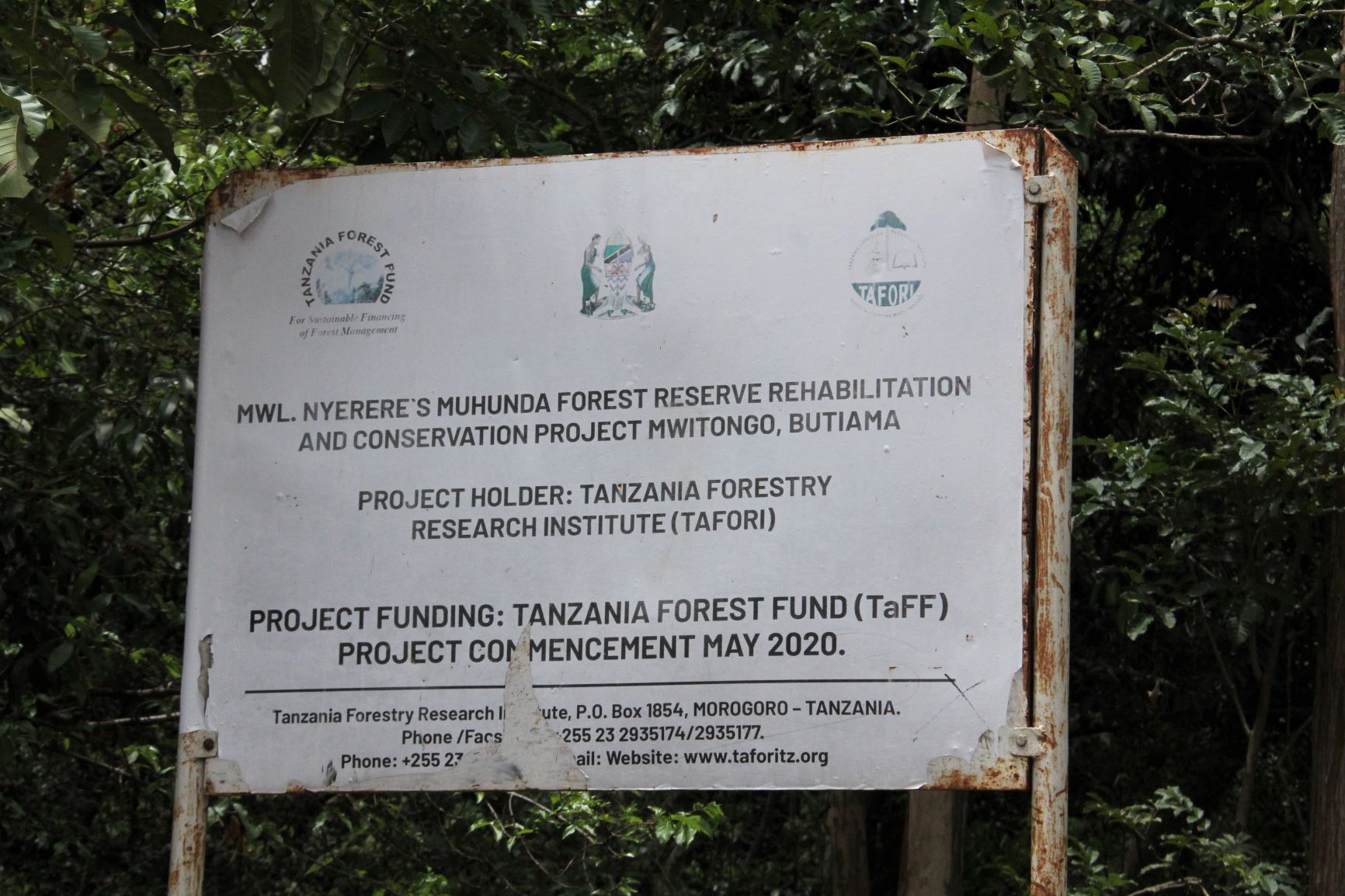 EVENTS IN THE MUSEUM
EVENTS IN THE MUSEUM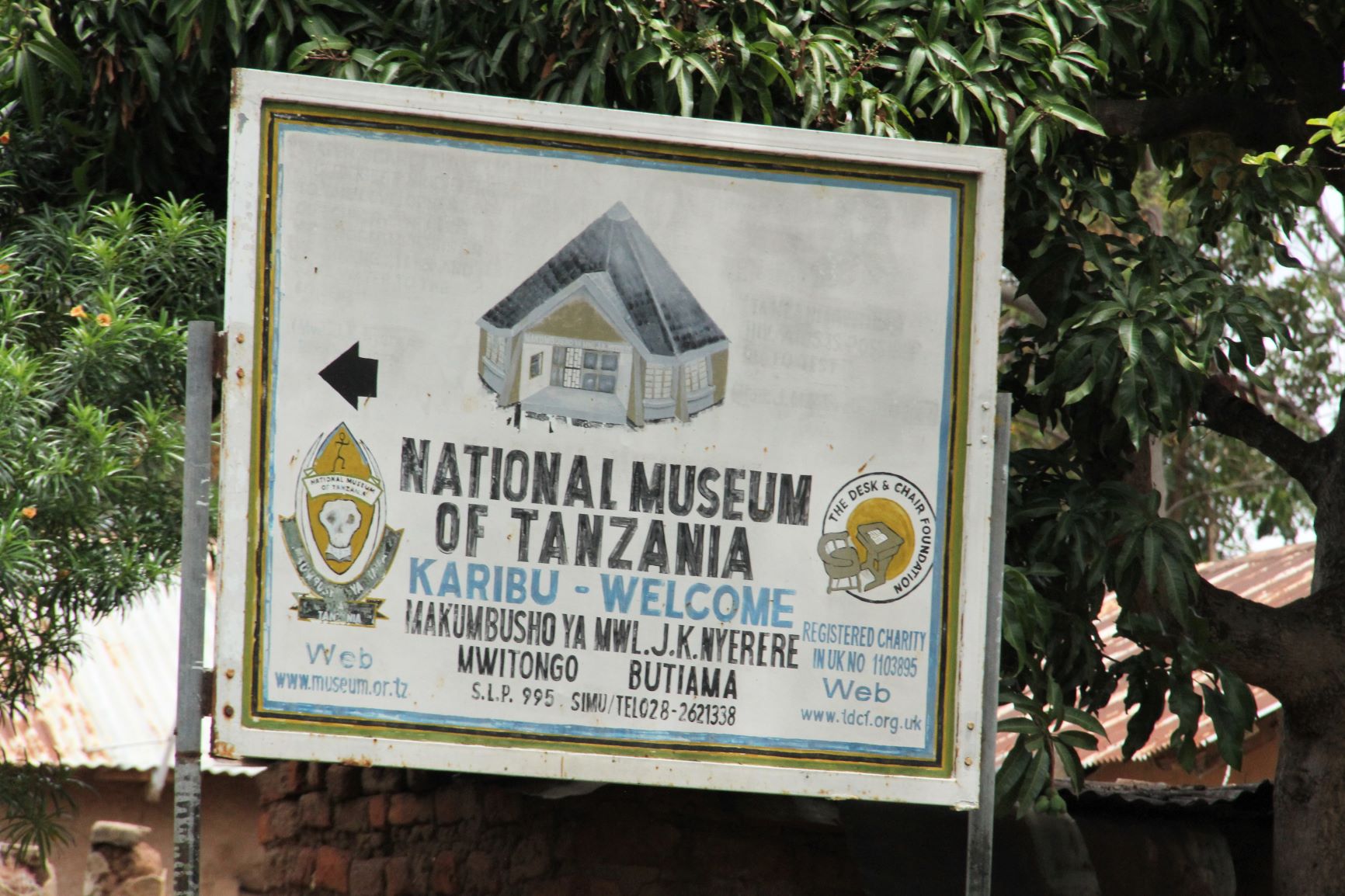

 Portrait of Mwalimu Julius Nyerere with a map of Tanzanian/Photo by Julius Mugaga Tukacungurwa.
Portrait of Mwalimu Julius Nyerere with a map of Tanzanian/Photo by Julius Mugaga Tukacungurwa.
 Photo of the Father of Mwalimu Julius Nyerere /Photo by Julius Mugaga Tukacungurwa.
Photo of the Father of Mwalimu Julius Nyerere /Photo by Julius Mugaga Tukacungurwa. Photo of the Mother of Mwalimu Julius Nyerere /Photo by Julius Mugaga Tukacungurwa.
Photo of the Mother of Mwalimu Julius Nyerere /Photo by Julius Mugaga Tukacungurwa.



Makerere University Doctoral Gown of Mwalimu Julius Nyerere /Photo by Julius Mugaga Tukacungurwa.


